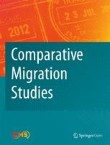Volumes 1 and 2 of Comparative Migration Studies are available here
A voluntary-sector meeting place as a site for interpreting and ‘doing’ integration: a case of later-life Russian-speaking migrants
While a great deal of research has been conducted on implications of integrative policies targeted at migrants, later-life migrants and their relational and spatial negotiations and enactments of the policy-dr...
